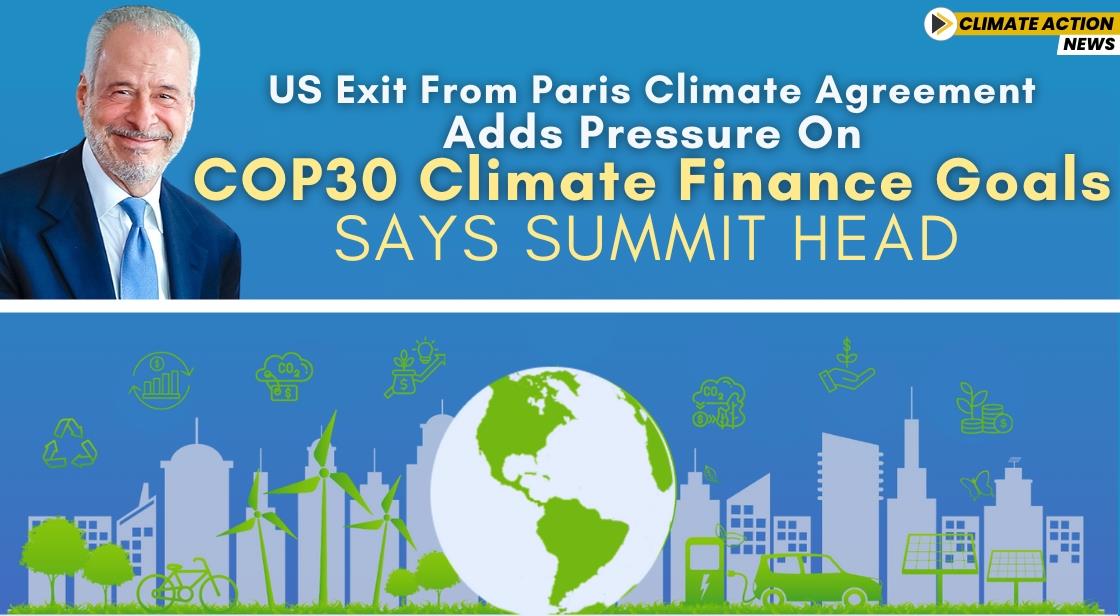US Exit from Paris Climate Agreement Adds Pressure on COP30 Climate Finance Goals, Says Summit Head

News Synopsis
Brazil aims to amplify the voices of developing nations in climate finance discussions, especially as global leaders prepare for the COP30 climate summit later this year. Hosted in Belem, an Amazon city, COP30 will mark a critical juncture for international climate negotiations.
Andre Correa do Lago, the head of COP30, highlighted on Thursday that the recent decision by U.S. President Donald Trump to withdraw from the Paris climate agreement will significantly complicate global climate finance goals.
Speaking in Brasilia, he warned that the negotiations at COP30 would likely be tougher compared to previous years due to reduced U.S. engagement in climate action.
Challenges for COP30 Amid U.S. Withdrawal
Correa do Lago explained that last year’s climate talks, held in Azerbaijan, saw the United States contributing to policies aimed at fighting climate change. However, the current U.S. administration’s stance signals a shift, potentially impacting the momentum of global collaboration.
The central theme of COP30 will revolve around resolving disputes between wealthy and developing nations over financial contributions to address climate change. Key expectations for the summit include advancing discussions on how poorer nations can finance their transitions to clean energy and mitigate the effects of global warming.
Developing Nations Demand More Action
During the Azerbaijan summit, developed nations pledged $300 billion annually by 2035 to assist developing nations in combating climate change. However, this commitment falls short of the estimated $1.3 trillion per year that poorer nations argue is essential for a meaningful transition.
Correa do Lago criticized wealthier nations’ attempts to reduce their financial contributions, stating, “Rich countries want to lower their financial contributions, which is profoundly wrong.” Brazil, holding the presidency of the BRICS bloc of emerging economies, will work to unify developing nations’ positions to ensure stronger negotiations at COP30.
Brazil’s Role as COP30 Host
As the host of COP30, Brazil sees an opportunity to reshape the global climate finance debate. The Belem summit in November is expected to draw attention to the Amazon region, a vital carbon sink, and highlight the challenges faced by developing nations. Brazil’s leadership in climate diplomacy, combined with its BRICS presidency, positions the country as a key advocate for equitable climate financing.
What’s at Stake for COP30?
The stakes for COP30 are higher than ever, given the widening gap between the financial commitments of wealthy nations and the actual needs of developing countries. Experts believe that achieving a consensus at the summit is crucial for meeting long-term climate goals and avoiding further divisions between nations.
Correa do Lago underscored Brazil’s commitment to ensuring a balanced dialogue, stating that the summit could act as a turning point in addressing the financial disparities hindering global climate action.
About Paris Climate Agreement
The Paris Agreement is an international treaty on climate change. Adopted in 2015, it aims to strengthen the global response to the threat of climate change by keeping a global temperature rise this century well below 2 degrees Celsius above pre-industrial levels and to pursue efforts to limit the temperature increase even further to 1.5 degrees Celsius.
Here are some key aspects of the Paris Agreement:
-
Long-Term Temperature Goal: The agreement sets a long-term goal of holding the increase in the global average temperature to well below 2 °C above pre-industrial levels and pursuing efforts to limit the temperature increase to 1.5 °C above pre-industrial levels, recognizing that this would significantly reduce the risks and impacts of climate change.
-
Nationally Determined Contributions (NDCs): Each country determines, plans and communicates its own contributions – called Nationally Determined Contributions (NDCs) – to mitigate global emissions. These contributions are not legally binding under international law but are intended to reflect each country's ambition in contributing to the collective global effort.
-
Global Stocktake: The agreement includes a global stocktake every five years to assess the collective progress towards achieving the purpose of the agreement and to inform further climate action.
-
Adaptation: The agreement recognizes the importance of addressing the impacts of climate change through adaptation measures, such as building resilience and reducing vulnerability to climate change.
-
Loss and Damage: The agreement acknowledges the importance of addressing the loss and damage associated with the adverse effects of climate change, including impacts that cannot be avoided or addressed through mitigation or adaptation efforts.
-
Support for Developing Countries: The agreement recognizes the need for financial, technological, and capacity-building support to assist developing countries in implementing their climate action plans.
Key Significance:
-
Universality: The Paris Agreement is the first truly universal climate agreement, with nearly all countries of the world participating.
-
Flexibility: The agreement allows for flexibility in how countries contribute to climate action, recognizing the different national circumstances and capabilities.
-
Long-term Vision: The agreement provides a long-term framework for international cooperation on climate action, guiding global efforts to address this critical challenge.
Challenges and Criticisms:
-
Implementation: While the agreement sets ambitious goals, its success depends on the effective implementation of NDCs by individual countries.
-
Insufficient Ambition: Some argue that the current NDCs are not ambitious enough to limit global warming to 1.5 °C.
-
Funding and Support: Ensuring adequate financial and technological support for developing countries remains a significant challenge.
The Paris Agreement represents a significant step forward in international efforts to combat climate change. However, its success will depend on continued international cooperation, ambitious climate action by all countries, and ongoing efforts to address the challenges associated with its implementation.
In conclusion, the upcoming COP30 summit in Brazil will be a pivotal moment in the fight against climate change, especially as the absence of the U.S. from the Paris Agreement adds complexity to the global negotiations.
With Brazil leading the charge, there is an opportunity to amplify the voices of developing nations, ensuring they are not sidelined in the global climate finance conversation.
The focus will be on bridging the financial gap, with poorer nations demanding more robust support to transition to clean energy and mitigate the impacts of climate change.
As Brazil emphasizes, it’s crucial that wealthier nations fulfill their financial commitments to avoid exacerbating global inequality. COP30 will not only determine the future of climate finance but could also reshape international collaboration, ensuring that climate action remains inclusive and equitable. The outcomes of this summit will have lasting implications for achieving global climate goals.
You May Like









